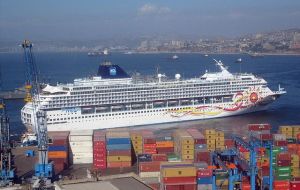MercoPress. South Atlantic News Agency
Cruise vessels avoiding Chile: another 35% downturn anticipated for 2010/2011
 The magnificent Norwegian Sun no longer will call in Valparaiso
The magnificent Norwegian Sun no longer will call in Valparaiso Cruises through the waters of Patagonia and around the most southern point of South America are a popular tourist attraction for US and European tourists. In more recent years however, cruise lines have started avoiding Chilean ports.
Cruises are known for the great numbers of tourists they bring into port cities, where passengers usually disembark and spend a few days in the host city, visiting historical sites, dining in restaurants and doing city tours.
Over the past few seasons, however, there has been a notable decline in the number of passengers who choose to disembark in Chilean port cities, as well as a decline in the number of cruisers that call at Chilean ports. This is attributed to the high prices cruises lines must pay to navigate Chilean waters and dock in port cities, and the high disembarkation fees slapped in cruise passengers.
For example, if a passenger were to do a 15-day cruise from Buenos Aires, Argentina, to Valparaiso, Chile, they would end up paying an additional US$500 just to stop and disembark in Chile’s national ports.
Valparaíso is Chile’s main port and has always been a major stopping point for cruises passing through South America. The cruise season run from November to April, and has been a major source of revenue for the city and Region V during these summer months.
In the 2008-2009 season around 104,000 passengers passed through the Valparaíso port. But in 2009-2010, only about 68,000 passengers passed though the port, a 35% drop. For the next season it is expected that only 45,000 passengers will come through Valparaíso, another 34% drop from last season and a total 53% drop from 2008.
The number of ships passing through the port and the number of times each ship stops in the port is also reflected in this decline. In the 2008-2009 season a total of 25 ships called a total of 47 times in Valparaíso.
For the upcoming 2010-2011, season only 18 ships are anticipated to call in a total of 28 times. That is a 28% decrease in the number of vessels and 41% in calls. This decline in Valparaíso is reflected throughout Chile’s other port cities.
A major reason for the anticipated further decline of cruise tourism in Chile was the sale of the boat Norwegian Sun by the Norwegian Cruise Line. The NCL is one of the biggest cruise companies in the world and the Norwegian Sun was the third boat from the NCL cruise line to start in Buenos Aires, pass through the Southern point of South America and end in Valparaíso.
This vessel could carry up to 2,400 passengers and for the past four years has brought over 104,000 tourists to Chile.
But this past April, the Norwegian Sun passed through the port of Valparaíso for the 47th and final time and the NCL has made no indication of replacing this boat or of continuing with this route.
NCL was one of the major pioneers for cruises throughout South America and put Chile on the cruise industry’s map.
A NCL press release cited several reasons for discontinuing docking at Chilean ports. Port congestion was cited as a main reason, due to lack of coordination by the port itself and the various cruise companies that call at Valparaíso, sometimes with up to three vessels docking in the same weekend, followed by weeks of not having a single call.
But the other big problems cited was the high price cruise companies must pay to bring passengers into the port cities – up by as much as 400% in recent years in several port cities. There are three different fees associated with passing through the southern point of South America and docking in Chile: the fee to cover the cost of the Maritime Authority, used to navigate the southern waters; the fee of using the port itself; and the fees attached to transporting passengers from the cruise ship into the city.
Each cruise ship must also pay a harbour tax, which is calculated using a flat fee multiplied by the boat’s size in meters, as well as a flat fee for each passenger that disembarks.
In ports throughout the world there is a competition to have the lowest harbour fees, but a recent Andes University study found that docking in Valparaiso is three times more expensive than docking in Argentina and nine times more expensive then docking in Uruguay.
The NCL is not the only company that has stopped calling at Chilean ports, other cruise companies have begun to follow suit and more have chosen to avoid stopping in Chile altogether due to the difference in costs.
By Stephanie Iris Schendel – Santiago Times




Top Comments
Disclaimer & comment rulesCommenting for this story is now closed.
If you have a Facebook account, become a fan and comment on our Facebook Page!